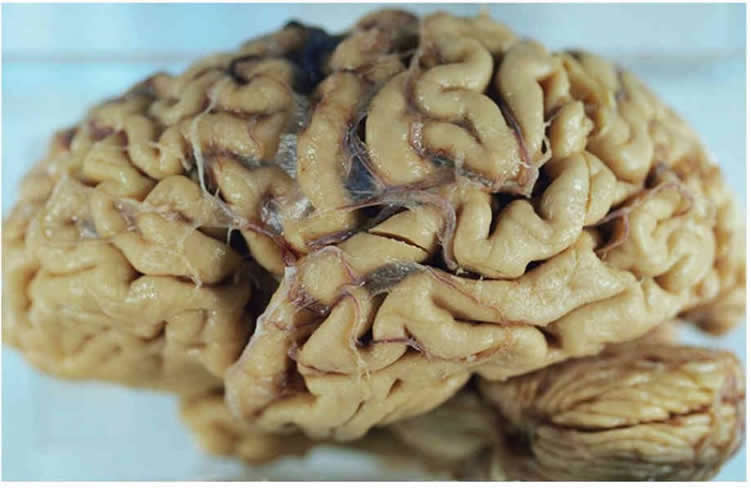Summary: Researchers report mice can retain their memories and ability to learn when almost all ApoE is removed from the brain but kept present in the liver to filter cholesterol.
Source: UT Southwestern.
A protein linked to higher risk of Alzheimer’s can be removed from the brains of mice without hindering memory and learning, according to a study that addresses whether potential therapeutics targeting this protein would have detrimental side effects.
The study from the Peter O’Donnell Jr. Brain Institute also showed, however, that the protein’s absence in other parts of the body hinders brain function as blood cholesterol levels rise. This result substantiates previous research that indicated cardiovascular health affects the brain.
Researchers focused on the removal of apolipoprotein E (ApoE), which in a certain form can support the buildup of toxic plaques in the brains of Alzheimer’s patients. Studies elsewhere have sought to determine whether reducing ApoE could be an effective treatment in preventing the disease, but a lingering question has been whether the protein is necessary for healthy brain function.
The study found that mice can maintain their learning and memory when virtually all ApoE is removed from the brain but kept present in the liver to filter cholesterol. Mice that lacked ApoE in both the brain and liver experienced unhealthy cholesterol levels and lost cognitive function.
More research is needed to determine what causes the cardiovascular issues to affect the brain, said Dr. Joachim Herz, the study’s Principal Investigator and Professor of Molecular Genetics, Neuroscience, Neurology and Neurotherapeutics at the O’Donnell Brain Institute at UT Southwestern Medical Center.
But the findings, published in The Journal of Neuroscience, add support to the belief that reducing ApoE in the brain could eventually be a viable therapeutic option for treating Alzheimer’s.

“This approach still holds potential,” said Dr. Herz, holder of the Thomas O. and Cinda Hicks Family Distinguished Chair in Alzheimer’s Disease Research and Director of the Center for Translational Neurodegeneration Research.
ApoE has several roles in the body, including transporting cholesterol and related molecules such as b-amyloid that form plaques in the brains of Alzheimer’s patients if not properly filtered or removed.
The type of ApoE produced by the ApoE gene determines how effectively the amyloid is removed from the brain. ApoE2 is the most effective, ApoE3 is in the middle and ApoE4 is the most likely to allow for the buildup of amyloid plaques. People whose genes produce ApoE4 are at high risk of developing Alzheimer’s.
Studies are ongoing at UT Southwestern and elsewhere to further understand the various effects that ApoE4 removal has on brain and body function.
The latest study was performed by Courtney Lane-Donovan, a Medical Science Training Program student in her final clinical year with her colleagues and co-authors Wen Mai Wong, Dr. Murat S. Durakoglugil, Dr. Catherine R. Wasser, Dr. Shan Jiang, and Dr. Xunde Xian in the Department of Molecular Genetics and the Center for Translational Neurodegeneration Research.
Funding: The research was supported with funding from the National Institutes of Health, the American Health Assistance Foundation, the Consortium for Frontotemporal Dementia Research, the Bright Focus Foundation, the Lupe Murchison Foundation, and the Ted Nash Long Life Foundation.
Source: James Beltran – UT Southwestern
Image Source: This NeuroscienceNews.com image is in the public domain.
Original Research: Abstract for “Genetic Restoration of Plasma ApoE Improves Cognition and Partially Restores Synaptic Defects in ApoE-Deficient Mice” by Courtney Lane-Donovan, Wen Mai Wong, Murat S. Durakoglugil, Catherine R. Wasser, Shan Jiang, Xunde Xian, and Joachim Herz in Journal of Neuroscience. Published online September 28 2016 doi:10.1038/mp.2016.160
[cbtabs][cbtab title=”MLA”]UT Southwestern. “Alzheimer’s Linked Protein Can Be Removed From Brain Without Hindering Memory and Learning.” NeuroscienceNews. NeuroscienceNews, 4 October 2016.
<https://neurosciencenews.com/apoe-alzheimers-memory-5199/>.[/cbtab][cbtab title=”APA”]UT Southwestern. (2016, October 4). Alzheimer’s Linked Protein Can Be Removed From Brain Without Hindering Memory and Learning. NeuroscienceNews. Retrieved October 4, 2016 from https://neurosciencenews.com/apoe-alzheimers-memory-5199/[/cbtab][cbtab title=”Chicago”]UT Southwestern. “Alzheimer’s Linked Protein Can Be Removed From Brain Without Hindering Memory and Learning.” https://neurosciencenews.com/apoe-alzheimers-memory-5199/ (accessed October 4, 2016).[/cbtab][/cbtabs]
Abstract
Genetic Restoration of Plasma ApoE Improves Cognition and Partially Restores Synaptic Defects in ApoE-Deficient Mice
Alzheimer’s disease (AD) is the most common form of dementia in individuals over the age of 65 years. The most prevalent genetic risk factor for AD is the ε4 allele of apolipoprotein E (ApoE4), and novel AD treatments that target ApoE are being considered. One unresolved question in ApoE biology is whether ApoE is necessary for healthy brain function. ApoE knock-out (KO) mice have synaptic loss and cognitive dysfunction; however, these findings are complicated by the fact that ApoE knock-out mice have highly elevated plasma lipid levels, which may independently affect brain function. To bypass the effect of ApoE loss on plasma lipids, we generated a novel mouse model that expresses ApoE normally in peripheral tissues, but has severely reduced ApoE in the brain, allowing us to study brain ApoE loss in the context of a normal plasma lipid profile. We found that these brain ApoE knock-out (bEKO) mice had synaptic loss and dysfunction similar to that of ApoE KO mice; however, the bEKO mice did not have the learning and memory impairment observed in ApoE KO mice. Moreover, we found that the memory deficit in the ApoE KO mice was specific to female mice and was fully rescued in female bEKO mice. Furthermore, while the AMPA/NMDA ratio was reduced in ApoE KO mice, it was unchanged in bEKO mice compared with controls. These findings suggest that plasma lipid levels can influence cognition and synaptic function independent of ApoE expression in the brain.
SIGNIFICANCE STATEMENT One proposed treatment strategy for Alzheimer’s disease (AD) is the reduction of ApoE, whose ε4 isoform is the most common genetic risk factor for the disease. A major concern of this strategy is that an animal model of ApoE deficiency, the ApoE knock-out (KO) mouse, has reduced synapses and cognitive impairment; however, these mice also develop dyslipidemia and severe atherosclerosis. Here, we have shown that genetic restoration of plasma ApoE to wild-type levels normalizes plasma lipids in ApoE KO mice. While this does not rescue synaptic loss, it does completely restore learning and memory in the mice, suggesting that both CNS and plasma ApoE are independent parameters that affect brain health.
“Genetic Restoration of Plasma ApoE Improves Cognition and Partially Restores Synaptic Defects in ApoE-Deficient Mice” by Courtney Lane-Donovan, Wen Mai Wong, Murat S. Durakoglugil, Catherine R. Wasser, Shan Jiang, Xunde Xian, and Joachim Herz in Journal of Neuroscience. Published online September 28 2016 doi:10.1038/mp.2016.160






